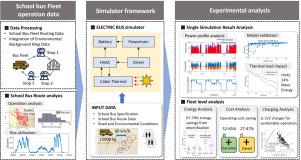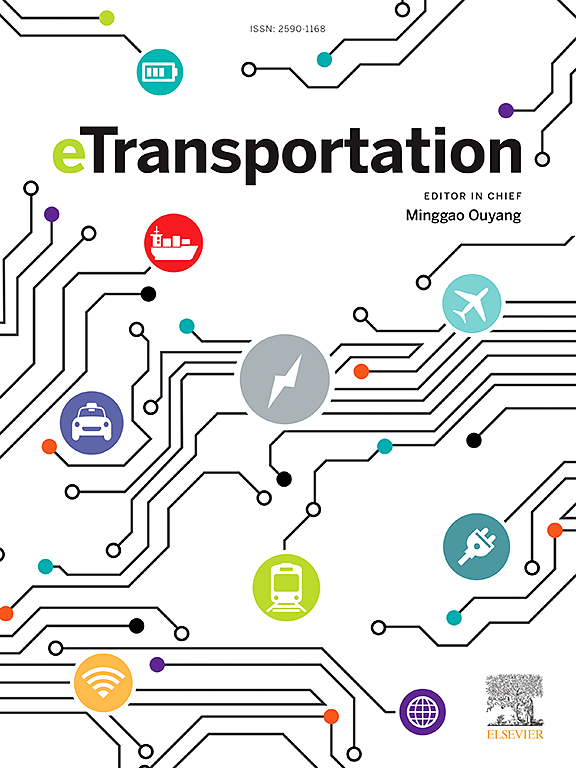Comprehensive energy footprint of electrified fleets: School bus fleet case study
IF 15
1区 工程技术
Q1 ENERGY & FUELS
引用次数: 0
Abstract
This paper proposes a comprehensive framework for estimating the energy footprint and benefits of electrified vehicle fleets prior to their deployment. To support this analysis, it introduces a control-oriented electric bus simulator model that not only captures driving power requirements but also incorporates a thermal model for cabin behavior and a Heating Ventilation and Air Conditioning (HVAC) system for heating and cooling. By analyzing current bus routes and road terrain data, the energy demand and economic effects are estimated, taking into account the current operational characteristics of school buses. As a case study, it examines the potential advantages of electrifying school bus fleets in the Central School District in Ohio, USA, with a focus on energy savings and environmental impact reduction. Our findings suggest that transitioning to electric school buses could achieve up to 76% energy savings compared to gasoline buses and 67% energy savings compared to diesel buses. Economically, when converted to operational costs, this results in a savings of 52%–65% compared to gasoline and 27%–47% compared to diesel, depending on the specific price rate. The accuracy of our model is calibrated using actual operational data from school bus fleets. Furthermore, this study provides foundational insights into the charging requirements through the energy footprint analysis. This study contributes to the advancement of sustainable transportation by presenting comprehensive preliminary analysis results for vehicle electrification through a specific case study. It emphasizes the practical implementation of electric school buses and optimized vehicle efficiency, aligning with broader eco-friendly initiatives in the transportation sector.

电气化车队的综合能源足迹:校车车队案例研究
本文提出了一个综合框架,用于在部署电气化车队之前估算其能源足迹和效益。为了支持这一分析,本文引入了一个以控制为导向的电动公交车模拟器模型,该模型不仅能捕捉到驾驶功率要求,还结合了车厢行为热模型和用于加热和冷却的暖通空调(HVAC)系统。通过分析当前的校车路线和道路地形数据,考虑到校车当前的运行特点,对能源需求和经济效应进行了估算。作为一项案例研究,它探讨了美国俄亥俄州中央学区校车电动化的潜在优势,重点是节约能源和减少对环境的影响。我们的研究结果表明,与汽油校车相比,过渡到电动校车可实现高达 76% 的节能,与柴油校车相比,可实现 67% 的节能。在经济上,根据具体的价格比率,如果换算成运营成本,与汽油相比可节约 52%-65% 的能源,与柴油相比可节约 27%-47% 的能源。我们使用校车车队的实际运营数据对模型的准确性进行了校准。此外,本研究还通过能源足迹分析为充电要求提供了基础性见解。本研究通过一个具体案例研究,全面展示了车辆电气化的初步分析结果,为推动可持续交通做出了贡献。它强调了电动校车的实际应用和车辆效率的优化,与交通领域更广泛的生态友好型倡议相一致。
本文章由计算机程序翻译,如有差异,请以英文原文为准。
求助全文
约1分钟内获得全文
求助全文
来源期刊

Etransportation
Engineering-Automotive Engineering
CiteScore
19.80
自引率
12.60%
发文量
57
审稿时长
39 days
期刊介绍:
eTransportation is a scholarly journal that aims to advance knowledge in the field of electric transportation. It focuses on all modes of transportation that utilize electricity as their primary source of energy, including electric vehicles, trains, ships, and aircraft. The journal covers all stages of research, development, and testing of new technologies, systems, and devices related to electrical transportation.
The journal welcomes the use of simulation and analysis tools at the system, transport, or device level. Its primary emphasis is on the study of the electrical and electronic aspects of transportation systems. However, it also considers research on mechanical parts or subsystems of vehicles if there is a clear interaction with electrical or electronic equipment.
Please note that this journal excludes other aspects such as sociological, political, regulatory, or environmental factors from its scope.
 求助内容:
求助内容: 应助结果提醒方式:
应助结果提醒方式:


